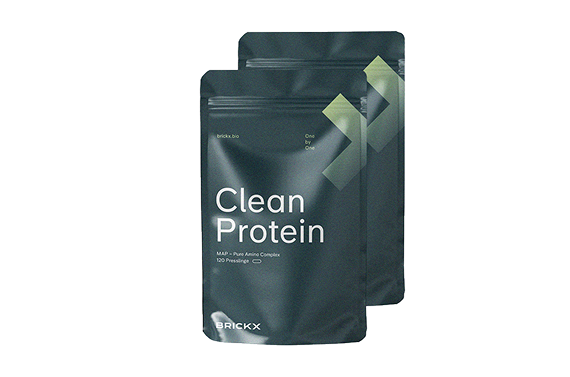Vegan nutrition & proteins: Why MAP is the game changer

1. between ethics, health and performance: vegan nutrition in transition
More and more people are opting for a plant-based diet for ethical, ecological or health reasons. The advantages are obvious: lower CO₂ emissions, less environmental impact, no animal products. At the same time, we are seeing a new generation of vegans who not only want to do without, but also want to Functional self-careThe body should remain efficient - in everyday life, at work and during training.
But this is precisely where the question arises: Is a plant-based diet sufficient to provide the body with the optimum amount of nutrients - especially high-quality protein?
2. vegetable protein sources: Good conscience - limited utilization
Plant-based protein sources such as lentils, beans, tofu or quinoa provide important amino acids, but often not in the ideal ratio. The human body needs eight essential amino acids in a precise ratio in order to synthesize proteins efficiently. If just one amino acid is missing, this can slow down the entire utilization chain.
Another problem:
-
Plant proteins have lower bioavailability on
-
You are often with antinutrients such as phytates or lectins combined
-
In many cases, the digestive process produces more nitrogen waste, which must be excreted via the liver and kidneys
The result: even with a high protein intake from plant-based foods, a functional protein deficiency can occur - with consequences for the muscles, immune system, hormone balance and regeneration.

3 MAP - The smart solution for vegan performers
This is where MAP comes into play: the Master Amino Acid Pattern consists of eight essential amino acids in a ratio that the body can utilize almost completely. with a net nitrogen utilization of 99 %. For vegans, MAP offers a Completely plant-based, purely amino-based alternative, which is not dependent on soy, gluten or pulses.
Advantages for vegans:
-
No digestive stress, as MAP is already available in free form
-
Fast recording, as no enzymatic digestion is necessary
-
No methionine surplus, as with many vegan protein powders
-
No sugar, no sweetener, no additives
Short: MAP complements vegan nutrition on a functional level - without compromise.
4. living vegan, targeted care - a modern understanding of health
The future of plant-based nutrition lies in the combination of ethical stance and biochemical precision. Because if you want to do your body good, you need to understand how it works. A balanced vegan diet needs targeted supplements - not out of dogmatism, but out of physiological reality.
MAP is not a substitute for food, but a strategic supplement - especially for people with high demands on health, performance and regeneration. This applies not only to athletes, but also to busy people, those in need of care, the elderly and pregnant women - in other words, all those whose Particularly high or specific protein requirement is.
Conclusion
A vegan diet is not a trend, but an expression of modern values. However, for the body to remain healthy and efficient in the long term, it needs more than plant-based protein. MAP provides the answer to a central problem of plant-based nutrition: The targeted, complete supply of the right amino acids. For all those who want to eat consciously, vegan - and yet efficiently.
- Wolfe, R. R. (2017). Role of amino acids in the regulation of muscle protein synthesis and breakdown. Current Opinion in Clinical Nutrition & Metabolic Care.
- Mariotti, F. & Gardner, C. D. (2019). Dietary Protein and Amino Acids in Vegetarian Diets. Nutrients.
- Elmadfa, I., & Meyer, A. L. (2017). Animal proteins as important contributors to a balanced human diet. Amino Acids.
- Pasiakos, S. M., et al. (2015). Protein and amino acid requirements during weight loss. American Journal of Clinical Nutrition.
- Young, V. R., & Pellett, P. L. (1994). Plant proteins in relation to human protein and amino acid nutrition. American Journal of Clinical Nutrition.
